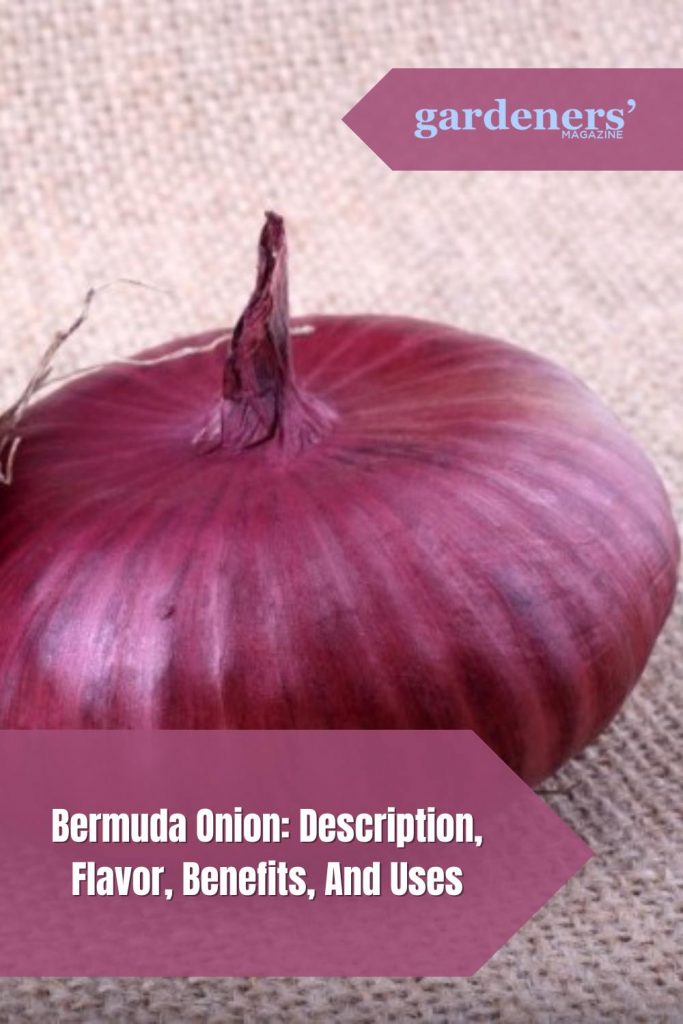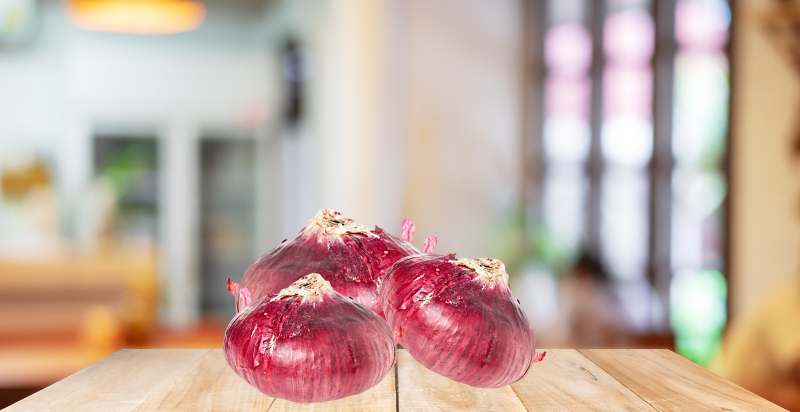Bermuda Onion is a unique variety of onion grown on the island of Bermuda. This small, sweet onion has an intense flavor and is a popular ingredient in many dishes. It is often used to add flavor and texture to soups, salads, sauces, and stir-fries. It is also popular in burgers and sandwiches for added flavor and crunch. Here’s a look at the history, nutrition facts, and uses of the Bermuda onion.
What is Bermuda Onion?
Bermuda Onion is a type of onion native to the Caribbean islands. It is a large, sweet-tasting variety with a light yellow hue and thin skin. The mild flavor makes it perfect for salads, sandwiches, sauces, and as an all-purpose cooking ingredient. Its distinctive flavor also works well in salsas, relishes, pickles, and chutneys. It is also popular as an accompaniment to fish dishes. It can also be prepared in several ways, from simple sautéing to complex recipes. Whether added raw or cooked, Bermuda Onion adds a unique flavor and crunch to any dish.

History and Origin of Bermuda Onion:
The Bermuda onion is a cultivar of the sweet yellow onion, and it has been grown on the island of Bermuda since the early 1600s. It was said to have been introduced by the Spanish, who brought it with them when they landed on Bermuda’s shores in the late 1500s. The onion soon became popular with the local farmers, and it is now a staple of Bermuda’s agricultural industry.
The Bermuda onion is characterized by its mild, sweet flavor and white to pale yellow color. It has a delicate thin skin that peels away easily, making it ideal for salads, pickles, and grilling. Its shape is also unique – it is slightly flattened on the top and bottom with a small “foot” at the stem end.
Despite its popularity, the Bermuda onion has been increasingly challenged in recent years by other varieties of sweet onions that have become available at local grocery stores. The availability of these other onions has made it difficult for the Bermuda onion to compete in a competitive market. Yet, its unique characteristics still make it one of the most treasured ingredients on the island. As a result, it continues to be an important part of the local culture and cuisine and will remain a part of the Bermudian diet for many years to come.
Description of the Bermuda Onion:
The Bermuda Onion is a large, round onion with an average diameter of 10 cm. Its thin outer skin is yellow, and its flesh on the inside is white. The onion is low in calories and a good source of fiber, vitamins C and B6, folate, and potassium. It also contains compounds that may help reduce inflammation and improve heart health. The onion is a staple in Caribbean cuisine, often used as the base for fish stews.
Flavor Profile of Bermuda Onion:
Bermuda onion is known for its mild, sweet, and tangy flavor. Its unique flavor can be attributed to its high sugar content, usually around 10%. The texture of Bermuda onion is crisp and crunchy, making it an ideal ingredient for many dishes. Its flavor also pairs well with other ingredients, such as garlic, herbs, and spices. Bermuda onion can also add a unique flavor dimension to salads or soups.
When cooked, the sugar caramelizes and adds a touch of sweetness to the dish. The onion also provides a pleasant aroma when cooked, adding a pleasant depth of flavor to various dishes. Whether raw, cooked, or roasted, Bermuda onion will surely bring an unforgettable flavor to any dish.
Health Benefits of Bermuda Onion:
Bermuda onions are a nutritional powerhouse packed with vitamins and minerals that can strengthen immune systems, reduce inflammation and help maintain healthy blood sugar levels. They are low in calories and fat yet high in dietary fiber, which can help maintain a healthy digestive system. One cup of Bermuda onions contains just 50 calories but contains vitamins A, C, and K and essential minerals such as calcium, magnesium, potassium, and iron.
The antioxidants found in the onion can help protect cells from free radical damage. In contrast, their anti-inflammatory properties can help reduce the risk of many chronic conditions like heart disease and cancer. Furthermore, Bermuda onions are rich in prebiotic fiber, which helps promote the growth of beneficial bacteria in the gut and aids digestion. All these health benefits make Bermuda onions an excellent addition to any healthy diet.
Cultivation of the Bermuda Onion:
Bermuda Onions are best grown in full sun and well-drained, slightly acidic soil with a pH of 6.0 – 6.5. The onions should be planted in early spring or late fall 5cm (2″) deep, about 10 cm (4″) apart in rows that are 30 cm (12″) apart with the root ends pointed downwards and the tips up. As the plants grow, they may need to be thinned out to maintain proper spacing. Once established, regular weeding and watering are essential for a good harvest. Apply aged manure or compost every few weeks to keep the soil nutrient-rich.
Fertilize as needed with a balanced fertilizer such as 10-10-10 or 12-12-12. Once the tops of the onions begin to turn yellow and fall over, they are ready for harvest. Carefully dig around the bulbs with a garden fork and pull them out. Please place them in a cool, dry place for several days before brushing off the dirt and storing them in a cool, dark location for up to six months. With proper care and maintenance, Bermuda Onions can provide a delicious and nutritious addition to the garden for many years.
Harvesting of the Bermuda Onion:
Harvesting of the Bermuda Onion occurs when the bulbs reach a size of 1-2 cm in diameter and are generally ready for harvest three to four months after planting. The foliage should also be starting to turn yellow before they are harvested. When harvesting, it is important to remove any dirty or rotten onions from the soil and any that have already begun to sprout from the bulb.
The bulbs should be pulled gently but firmly from the soil so as not to damage them. Once harvested, the onions should be laid out in a sunny spot or hung up with twine for curing before storage. This process can take 1-4 weeks, depending on weather conditions, and is important for ensuring long-term storage of your freshly harvested Bermuda onions. Once cured, the onions should be stored in a cool, dry place, lasting up to four months if properly cared for.

Where Does Bermuda Onion Grow?
Bermuda onions are originally indigenous to the Caribbean but now grow in many other warm climates worldwide. In the United States, California is one of the leading producers of Bermuda onions. Other major growing regions include coastal areas of Texas and Louisiana in the South, as well as Florida and Georgia.
The climate of these regions is ideal for Bermuda onion growth, providing hot summer temperatures with plenty of suns and good drainage. In addition, Bermuda onions are also produced in parts of the Middle East, such as Israel, Turkey, and Egypt. In Australia, they are predominantly grown in New South Wales. Lastly, Bermuda onions can be found worldwide from countries like Colombia to South Africa. No matter where you find them, the unique flavor and crunchy texture of Bermuda onions make them a favorite for salads, sandwiches, and other dishes.
What are the things you need to keep in mind when buying Bermuda Onion?
- Choose Bermuda onions that are firm and heavy for their size. Avoid onions with soft spots or dark patches.
- To check the freshness, smell the end of the onion where it was cut from the stem. It should not have a strong odor or be overly intense.
- Look for tight skin on the onion. If the skin is loose or shows signs of mold, discard it.
- Check for any soil, insects, or discoloration on the outer surface of the onion before buying.
- Purchase onions free from cuts and bruises, which can lead to spoilage.
- Avoid purchasing pre-cut onions, as these can be less than fresh.
- Store your Bermuda onions in a cool, dark, dry area to ensure they last longer.
- Refrigerate the onions only when you plan to use them within a few days since cold air will cause them to spoil faster.
- Make sure to discard any that become moldy or have a sour smell.
- When you cook the onion, use it within a few days of being purchased. Otherwise, freeze them for up to two months.
By following these tips, you can ensure that the Bermuda onions you buy are fresh and last longer.
What is the Best Way to Store Bermuda Onion?
The best way to store Bermuda Onion is by keeping it dry in a cool, dark place in a mesh bag or container with holes to circulate air. It should be used within two weeks of purchase and kept away from direct sunlight and ethylene-producing fruits such as apples and bananas. Once cut, the onion should be refrigerated and used within three to five days.
To freeze, dice or slice the onion and store it in a freezer storage bag, removing as much air as possible before sealing it. Frozen Bermuda Onions should last up to six months in the freezer if stored properly. For longer-term storage, pickling is an option. The onions can be stored in jars or vacuum-sealed bags for up to 12 months. No matter how you store them, always discard any onions that have become slimy or have started to sprout.
How to Use Bermuda Onion in Recipes with others?
Bermuda onion can be used in a variety of ways when cooking with other fruits and vegetables. It adds a sweet flavor that pairs well with many dishes. Here are some suggestions for how to incorporate Bermuda onion into your recipes:
- Sautéed Bermuda onions make an excellent side dish to any meal, especially when topped with herbs or spices like basil, rosemary, garlic or oregano.
- Make a relish by mixing chopped Bermuda onions with cucumbers, tomatoes, and your favorite herbs and spices.
- Create a flavorful pico de gallo by mixing diced Bermuda onions with jalapenos, tomatoes, and cilantro.
- Make an easy marinade by combining olive oil, lemon juice, garlic, and diced Bermuda onion.
- Make a flavorful chutney using diced Bermuda onion, raisins, apples, and spices.
Conclusion:
Bermuda Onion is a sweet and mild onion perfect for recipes that call for onions. It stores well in the refrigerator and the freezer and can be pickled for long-term storage. Use it in soups, stews, stir-fries, tacos, burritos, and many other recipes to add flavor to your dish. With its versatility and delicious flavor, Bermuda onion is an excellent addition to any kitchen! Enjoy.
- Everything You Wanted to Know About Red Tamarillos - June 2, 2025
- A Guide to Tulips: Everything You Need to Know & More… - June 2, 2025
- Guanabana: Description, Flavor, Benefits, And Uses - May 27, 2025

4 thoughts on “Bermuda Onion: Description, Flavor, Benefits, And Uses”
Comments are closed.